First Homes is a flawed solution to three very different problems

What do you do when a government has all the right intentions for solving the country’s biggest challenges, but is going about it in entirely the wrong way?
That’s a question we should all be asking, particularly when considering the recently announced housing plan.
Optimistically entitled “First Homes”, the proposal is to offer a 30 per cent discount on some new homes to local buyers. Part of its aim is to help so-called “key workers” such as teachers, nurses, and prison officers find housing, as well as ensuring that veterans do not find themselves homeless when they leave the armed forces.
These are important issues. The UK’s housing crisis is causing misery for millions — especially younger people. Public services are stretched due to issues around recruiting and retaining staff, especially in urban areas where living costs are high. And we can all agree that it is shameful that people are living on the streets in the UK, especially those who have so bravely served our country.
But is the government’s First Homes policy really the best way to address these various challenges?
The main reason we have a housing crisis is because supply has failed to keep up with demand. The country has an incredibly restrictive planning system which limits what can be built and where. Stamp duty land tax also gums up the market, making people reluctant to sell even when their homes are no longer suitable for them. Like anything in life, when there is a lot of demand for a good that’s in short supply, the cost goes up.
The solution is simple: increase supply. The government can do this by liberalising the planning system.
For example, much of the green belt around our cities is of little agricultural or environmental benefit, so there should be an audit of this land to find the most suitable places in which to build homes while also protecting areas of natural beauty.
Stamp duty should also be scrapped and replaced with a land value tax to increase the rate of house moving.
What about helping “key workers”? While it is true that housing costs are an issue, this is a symptom of the problem, not the cause. The main reason we struggle to attract enough people into jobs such as teaching, nursing, or prison work is low pay. Most people don’t go into these jobs for the money, but they still need enough to live and enjoy a good quality of life.
The government should put an end to salary caps and centralised pay bargaining, and give individual organisations more flexibility. If schools in the north east, for example, are struggling to attract maths teachers, then they should have more funds available to increase wages.
We could also tackle the retention issue by introducing performance-related pay so that the highest quality individuals are incentivised to stay in their professions. Liberalising immigration would further increase the supply of workers in these fields.
As for veterans, rather than making it slightly easier for them to buy a home, it is surely more important to ensure that they receive the help they need. Many leave the forces traumatised by what they have experienced.
As such, the government should start by guaranteeing that they have counselling and support as soon as they need it and for as long as they need it. There should also be more of a focus on helping former armed services personnel to readjust to the realities of civilian life, and encouraging businesses to recruit them. Our veterans deserve real help and support, not empty gimmicks.
There is a housing crisis in this country, public services are stretched, and many veterans find themselves homeless. Rather than trying to fix all that with some tinkering in the housing market, the government needs to focus on the basic economic principle of supply and demand.
Back to basics, please.
Main image credit: Getty
